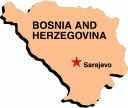|
|
Forensic
Anthropology |
|||
|
|
||||
|
|
||||
|
|
Forensic
Anthropology |
|||
|
|
||||
|
|
||||
Education and Career Planning Recommendations
Frequently Asked Questions (FAQ's)
![]() What kind
of job can I get as a forensic anthropologist?
What kind
of job can I get as a forensic anthropologist?
Employment as a forensic anthropologist falls into two basic categories, in the US:
![]() academic
academic
![]() applied
applied
While forensic anthropology is an applied field, a large majority of forensic anthropologists are physical anthropology professors developing their careers in a university setting. The alternative to an academic career is the "applied" employment setting--meaning outside of academe. Many forensic anthropologists working outside of the academic setting are employed by agencies involved in various levels of investigative-type work, where they develop their careers in a laboratory setting.
Academic setting: Professors' duties are divided into three categories: teaching, research, and service. Forensic anthropologists teach myriad courses in physical anthropology, conduct osteological research, and may consult on forensic cases as part of their service activities. In many areas of the US, there isn't a need for full-time human indentification from skeletal remains. This is really a good thing for society...what a shame if there were tons of skeletons out there, unidentified, where thousands of forensic anthropologists would be needed around the nation to analyze them 24 hours a day, seven days a week. What a mess.
Realistically, then, in most situations a forensic anthropologist does not practice forensic anthropology all the time, constantly, day in and day out. Rather, we are people whose expertise is called upon as needed. Of course there are exceptions--some large universities and or cities call upon a handful of forensic anthropologists frequently, but this is the exeption and not necessarily the norm (especially if you live in a rather peaceful community).
Applied setting: Forensic anthropologists are employed by museums, the Federal Bureau of Investigation (FBI), state bureaus of investigation, and by medical examiner/coroner offices. Many forensic anthropologists also work at the Central Identification Laboratory in Hawaii (CILHI--pronounced "seal-hi"). At CILHI, work involves excursions to Southeast Asia to search for and recover war casualties--from the Korean War and Vietnam Conflict. These remains are often very fragmentary and the analysis phase can take quite a while.
 |
Currently, many forensic anthropologists and graduate students studying forensic anthropology are providing much assistance in the effort to identify human remains in Bosnia. Forensic anthropologists can offer assistance in situations of mass disaster, war casualties, etc. |
The FBI calls upon forensic anthropologists as well. Many people want to study forensic anthropology with hopes of entering the FBI. Yet, think about how many forensic anthropologists the FBI really needs...plus, once you begin a career there, wouldn't you expect to be there around 30 years? The FBI doesn't need to hire thousands of forensic anthropologists. And, not all forensic anthropologists hired by the federal or state bureaus of investigation are doing forensic osteology full-time. Many are also trained in other forensic sciences or laboratory techniques to fill the day.
If you want to enter the FBI to become a Special Agent, and would like to have the forensic anthropology experience as your academic background, then that would be fine. Finding a job with such a specialized degree--outside of the academic setting--is not that easy. I realize this doesn't sound promising, encouraging, or very exciting. I believe, though, that this is true with any career choice where a very specialized background is needed. If you like it a lot--if you have a true passion for it, chances are that you'll study hard, and become good at it. The better you are at your chosen field of endeavor, the better your chances of finding employment. So stay centered, know that the path may be somewhat arduous, but with persistence and good timing, you'll be alright.
Employment opportunities and strategies are best learned by accessing many different venues of information. I will update this section in the near future as I myself gather more information for you. In the meantime, you may want to explore other web pages and write to other forensic anthropologists who may very well have different opinions on this subject.
Also, be sure to check out the American Academy of Forensic Sciences homepage: http://www.aafs.org
![]()